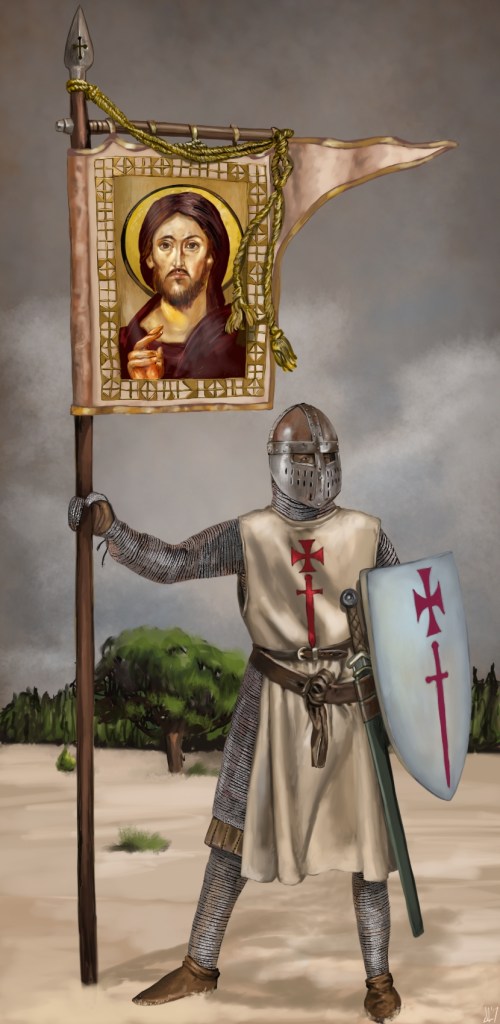Why would Christian Scriptures commend people for waging war? War, after all, is nearly universally condemned – even as it remains a relentless curse in various corners of our world.
One young pastor was “charged” with a duty that belongs, by biblical extension, to all believers. “This charge I entrust to you [that] you may wage the good warfare, holding faith and a good conscience” (1 Timothy 1).
The reason followers of Jesus are encouraged to actively train for and engage in war is because our enemies are not other human beings. We discussed this fact in our last conversation, as we considered the theological concept of the Church Militant.
To call the Body of Christ “militant” is misleading to those who don’t understand spiritual warfare, the fact that “we do not wrestle against flesh and blood, but against . . . the cosmic powers over this present darkness . . .” (Ephesians 6).
Unfortunately, because all of us are imperfect (i.e. fallen), Christians can sometimes fail to distinguish between our true enemies and those who witlessly follow their banner. For an excellent discussion of this, from a Roman Catholic perspective, I recommend you read “The Church Militant or the Church Belligerent?”
Another worthwhile read is “G.K. Chesterton and the March of the Church Militant.” There, Joseph Pearce shares Chesterton’s vivid description about how Gothic cathedrals visualize the martial aspect of the Christian Church.
The truth about Gothic [architecture] is, first, that it is alive, and second, that it is on the march. It is the Church Militant; it is the only fighting architecture.
All its spires are spears at rest; and all its stones are stones asleep in a catapult. In that instant of illusion, I could hear the arches clash like swords as they crossed each other. The might and numberless columns seemed to go swinging by like the huge feet of imperial elephants.
The graven foliage wreathed and blew like banners going into battle; the silence was deafening with all the mingled noises of a military march; the great bell shook down, as the organ shook up its thunder.
The thirsty-throated gargoyles shouted like trumpets from all the roofs and pinnacles as they passed; and from the lectern in the core of the cathedral the eagle of the awful evangelist crashed his wings of brass (“The Architect of Spears”).
As a master of words and wit, Chesterton’s writing rarely disappoints. You can download a free copy of The Man Who was Chesterton, which includes this essay, from Internet Archive.
C.S. Lewis did more to equip us for spiritual warfare with The Screwtape Letters than a thousand clergy with a hundred thousand sermons. As one Baptist theologian summed it up in an article about spiritual warfare:
On the subject of spiritual warfare, Lewis is a helpful guide. I’ll remember what he taught: There is an enemy. He seeks my destruction. And this is war.
There is a brilliant quote about this supernatural confrontation, ascribed (apparently in error) to the historical Martin Luther.
If I profess, with the loudest voice and the clearest exposition, every portion of the truth of God except precisely that little point which the world and the devil are at that moment attacking, I am not confessing Christ, however boldly I may be professing Christianity.
Where the battle rages the loyalty of the soldier is proved; and to be steady on all the battle-field besides is mere flight and disgrace to him if he flinches at that one point.
C.S. Lewis echoes this sentiment in The Magician’s Nephew. When Aslan questions the humble man whom he would crown the first King of Narnia, he poses a query which reveals the man’s courage and humility.
“And if enemies came against the land (for enemies will arise) and there was war, would you be the first in the charge and the last in the retreat?”
“Well, sir,” said the Cabby very slowly, “a chap don’t exactly know till he’s been tried. I dare say I might turn out ever such a soft ’un. Never did no fighting except with my fists. I’d try – that is, I ’ope I’d try – to do my bit.”
“Then,” said Aslan, “you will have done all that a King should do.”
If anyone would follow Christ, neutrality is not an option. Though some temporary retreats are inevitable, in God’s strength, we are empowered to continue our (in reality, the Lord’s) advance.
The battlelines are drawn, and they are real. As C.S. Lewis proclaimed in “Christianity and Culture” – “There is no neutral ground in the universe. Every square inch, every split second is claimed by God, and counterclaimed by Satan.”
The image above, “Livonian Sword Brother” (a member of a military monastic order) was created by JLazarusEB and is used here in compliance with the Creative Commons CC BY-NC-ND 3.0 License.


Excellent closing paragraph – Mr. Lewis’s summation.
Lewis never disappoints. Even when he bears such sobering tidings.
Despite the fact most people think they can simply remain on the sidelines… there is no neutral ground.
I held my breath as I entered this post.
Spot on.
That’s an interesting comment… one I’ve never received. And now made it my goal to always begin with “breathtaking” introductions!
Hahaha! I meant I just wasn’t sure which way you were going to go with this.
It turned out to be fine.
Oh, I knew exactly what you meant. That was precisely my intention with that first sentence. Have a great day.
Rob, The war is real and I feel it everyday. Do you feel too many believers are fighting a physical war and not a spiritual one?
Thanks,
Gary
That’s an interesting question, Gary. I’m concerned about how many people fall into the error of disbelieving in the clear biblical witness to the “spiritual” realm. Much of that dismissal comes, I think, from fear — an unwillingness to face the existence of personified spiritual darkness.
The irony is that no Christian need ever fear angels cast out of heaven, those for whom Hell is made (Matthew 25:41). After all, the Holy Spirit who abides within believers, is greater that any power arrayed against God’s children (1 John 4:4).
In seminary, one of my best profs was a psychiatrist, who had served many years in Madagascar as a medical missionary. He arrived there not believing in the existence of demons and after many years of exposure to their power — and their weakness, before Christ — he came to recognize their reality.
A complex subject. But I do believe most people would rather remain ignorant (in the unknowing/unexposed sense of the word) because they are too frightened that such things might actually be real.
Rob,
Go on their own way and ignoring signs. You hope they stop and read.
On Christ, Gary
Long ago I heard an addendum to 1 Peter 5:8, about our enemy the devil who is “always about, prowling like a lion roaring for its prey.” The addition? “Always remember: Christ removed his teeth at Calvary!” Such wonderful reassurance as we wage war each day.
That’s a great elaboration on the passage, and quite true.
Martin Luther was a prime example of Christians who have declared that since the Devil has been neutered, he deserves only our ridicule.
It’s similar to the reason why in some baptism rites, the catechumens symbolically spit on the Devil when they renounce him.
Inspiring.
The Word is the Sword for the War. CS Lewis? GK Chesterton? Their churches declared wars on our families in the past, and now we sit in America with fellow citizens declaring war on the rest of us with “cancer,” yet they cannot go preach the gospel for themselves. What’s this about CS Lewis being inspired by “Phantasmagoria?” Doesn’t sound Christian to me—sounds like a boys’ club who declares War instead of using the Sword of The Word. Templars are apropos here. Definitely go with the quote, “I am not professing Christ, however much I may be professing Christianity,” for the boys who wage war on Americans instead of letting Christ show them, “It is done.” The point of A House Divided in Matthew is you cannot cast out demons with demons (Phantasmagoria), or do I miss something there? God laughs as he tries to use us to save those who declare war on us because they think we are damned sinners.
Junia, might I ask you to be a bit clearer in your criticism? I really do want to understand what you’re saying. Don’t know where you are getting the “Phantasmagoria” reference from??? Christians have, since the very beginning, recognized we are engaged in spiritual warfare. And who is the “us” that they (Anglicans? and Roman Catholics?) have declared war against. Who, again, is waging “war on Americans?” As for the written Word of God being the sword of the Spirit… I agree with you wholeheartedly.